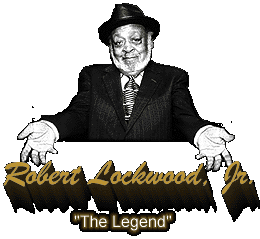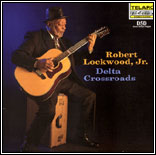

Courtesy of Robert Lockwood

Telarc
A FIRESIDE
CHAT WITH ROBERT LOCKWOOD, JR.
Sometimes words do not do enough justice and to call Robert Lockwood,
Jr. a legend is not enough, so I will just shut my trap and let you come
to your own conclusions. I am honored to present to you, a blues master,
unedited and in his own words.
FRED JUNG: Let's start from the beginning.
ROBERT LOCKWOOD, JR.: I was taught by Robert Johnson. I was already playing
the piano a little bit, so sense of time was really no problem. Robert
Johnson came into my mother's life and he could play so well, until I
guess everybody would want to learn how to play it like he did. After
he had been with my mother for about three or four months, he seen I was
really interested in it and he asked me if I really wanted to learn it.
I told him, "Yes, I did." He started letting me fool with the
guitar. I learned so fast that it kind of excited my momma. He showed
me something a couple of times and then I would have it. Finally, my auntie
bought me a guitar. Me and Robert put one together, but not having the
right kind of glue and stuff, it didn't stay together. And my auntie bought
me the guitar and I've been playing it ever since.
FJ: Robert Johnson is a blues icon, did it take a good deal of arm-twisting
to convince him to give you lessons?
ROBERT LOCKWOOD, JR.: Well, I wanted to play real bad so I really envied
him because I really wanted to play. By me being real interested, it didn't
take me really long to do nothing. Shit, in a couple of years, I was able
to play jobs. He really didn't want to teach nobody. I didn't have to
beg him because he seen that I really wanted to play by me being around
him every day. That is how I got a chance to learn. The next thing about
it was that I learned so fast. I learned extremely fast. When I first
started playing, I was playing for twenty-five cents a day, all nights.
We didn't have no unions and so you would have to play until whenever.
You would work until there was no one left for the night. By me being
so devoted to it, it didn't take me long to get it together.
FJ: You were one of the first to play an electric guitar.
ROBERT LOCKWOOD, JR.: Yeah, I am. It wasn't really an electric guitar.
At first, they made a pickup for the guitar. I would put it on the guitar
and fasten it and it would pick up the sound. It would be just like holding
a mic to it. It wasn't long before they started building the guitar with
the pickup in it. At first, it was just a pickup fastened to the guitar.
As soon as it came out, I bought one. As soon as I had seen it in the
catalog, I ordered one. I imagine Charlie Christian did. I know he did
because of him building a pickup. It was Charlie Christian that put the
small mics in the hole. The guitar has a big hole in it. All the guitars
had a whole in it. You just lay it over the guitar and sound came out.
And you know, Fred, this country is accustomed of stealing and taking
what they want. That is so bad. That man should have really been paid
for having the idea. He was never paid. No, he was never paid. There is
a man here, Fred, that made the column lock for a car and you know that
they would not give him nothing for that. It is so bad. The man who made
the first column lock is right here and he made the first column lock.
He wanted to make something so people couldn't steal his car and he made
the first column lock and he has tried all kinds of things to get paid
for the patent and they just changed a little thing around that he ain't
got on his and put something else on it and said that it is not his stuff.
That is so damn bad.
FJ: When did you move to Chicago? And what was the scene in Chicago at
the time?
ROBERT LOCKWOOD, JR.: It was 1940. There were blues there and it was very
good because there was little clubs all over the city where you could
play at. That is the best thing about Chicago being so large. Yeah, there
was a great, big demand for the blues when I first went to Chicago.
FJ: The country at that time was segregated.
ROBERT LOCKWOOD, JR.: Oh, yeah. It was all over. Yeah, it was a hard,
sure, to not be able to go to anyplace to be served and to ride on the
buses and streetcars, we had to sit in certain places.
FJ: It must have been trying playing the blues.
ROBERT LOCKWOOD, JR.: The blues is the biggest thing in this country.
The blues is the beginning of American music.
FJ: Are people starting to realize that now?
ROBERT LOCKWOOD, JR.: Well, it is in the history books.
FJ: What prompted you to put down the traditional six-string guitar for
a yet unproven twelve-string?
ROBERT LOCKWOOD, JR.: Well, I just thought the twelve-string guitar was
more fuller. It was more brighter. It had a better sound. Two strings
have got to have a better sound than one. My wife bought my first twelve-string
guitar from a student. She gave him seventy-five dollars for the guitar
and of course, the guitar was brand new. And the student just wanted some
money. I am still playing that guitar. She bought it and brought it home
and said, "I know I done messed up. I gave a student seventy-five
dollars for this here guitar." I looked at her and said, "You
done nothing wrong. The guitar looks brand new." One of the keys
on it was broken and that was all. My son had asked for the guitar and
I handed it to him. I came home and he had the guitar laying where it
was really dangerous for the guitar. I went to a music store and as I
walked in the door, I looked up and seen a picture of the guitar. I asked
the guy how much the guitar sold for and he told me that it was seven
or eight hundred dollars. Back at that time, that was a long time ago,
that was a lot of money. I turned right around and came home and picked
up the guitar and told my son that I would get him one. I took it in and
got a set of keys put on it and that was it. I have been playing it for
about thirty-five years.
FJ: Let's talk about your latest release on Telarc, Delta Crossroads.
ROBERT LOCKWOOD, JR.: I recorded that last year. I wrote so many songs
and I played quite a bit of other people's material because we get calls
for them. Anyway, I had a very bad year about when I was going to do it.
The album has got about eight tunes on it that would be mine.
FJ: And the future?
ROBERT LOCKWOOD, JR.: We are going to France next month. We are going
all over the world. I haven't been going out of the country too much here
lately. I don't know why. Do you know, Fred, every place I play by myself,
I get a standing ovation? I asked my agent why I wasn't working more.
Every place I play by myself, I get a standing ovation and I have always
got that. I've been very curious about that. Now, I am checking other
agents out because I have to get another agent because I want to work
more than I am working. I should be working everyday that I want to work.
I should be pushing work back. I am thinking about being able to buy what
I want to buy and stuff like that. When I am gone, it doesn't make a difference
if I am remembered or not. I want some money now (laughing). I will do
a record with the band. Telarc wants it, but I haven't really thought
about it just yet. I will do about four, five, six of mine on every album
I put out.
Fred Jung is the Editor-In-Chief and college life isn't anything like
the Girls Gone Wild videos. Comments? Email
Him